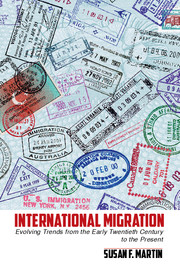Book contents
- Frontmatter
- Contents
- Foreword
- Acknowledgments
- List of Acronyms
- Introduction
- 1 Early Roots
- 2 “The Problem of Refugees”
- 3 Labor Mobility
- 4 Orderly and Humane Migration Management
- 5 Trafficking in Persons
- 6 Migration and International Security
- 7 Migration, the Environment, and Climate Change*
- 8 Migration and Development
- 9 Towards the Future
- Bibliography
- Index
9 - Towards the Future
Published online by Cambridge University Press: 05 August 2014
- Frontmatter
- Contents
- Foreword
- Acknowledgments
- List of Acronyms
- Introduction
- 1 Early Roots
- 2 “The Problem of Refugees”
- 3 Labor Mobility
- 4 Orderly and Humane Migration Management
- 5 Trafficking in Persons
- 6 Migration and International Security
- 7 Migration, the Environment, and Climate Change*
- 8 Migration and Development
- 9 Towards the Future
- Bibliography
- Index
Summary
This final chapter discusses recent and potential future efforts to improve international cooperation in managing migration. It focuses on the extent to which the international community is prepared to move in the direction of greater collaboration, identifying barriers to further action in developing a “migration regime.” It will also discuss the potential frameworks for addressing both forced and voluntary migration as well as the linkages and interconnections between the two dominant modes of migration. Of particular concern will be the identification of laws, policies, and institutional arrangements to address the complex, mixed migration that an issue such as climate change raises. Although the chapter sets out the many reasons that an international regime would be beneficial, it is also realistic about the obstacles to implementation. It concludes that the rather hesitant steps already taken toward developing new frameworks for interstate cooperation and international organization coordination have been helpful in building confidence but, at some point, these steps must result in actions that demonstrate the benefits of global cooperation. The chapter sets out a number of discrete areas in which cooperation may be forthcoming.
Recent Initiatives
Many national governments remain reluctant to consider the establishment of a single international migration regime that meets the criteria discussed in the introductory chapter – that is, to quote Krasner (1983) again, a “set of norms, decision rules and procedures which facilitate the convergence of expectations.” Yet, the twenty-first century has seen some very tentative steps in that direction. This section discusses two such efforts. The first, launched by the Swiss government, focused on intergovernmental cooperation, while the second, begun by Secretary-General Kofi Annan and taking form in the establishment of the GMG, dealt with many of the international organizations discussed in this book.
- Type
- Chapter
- Information
- International MigrationEvolving Trends from the Early Twentieth Century to the Present, pp. 270 - 292Publisher: Cambridge University PressPrint publication year: 2014

